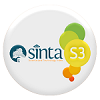THE ROLE OF THE FAMILY IN FORMING NATIONALISM
Abstract
The background of this writing is the decreasing of nationalism among the youth of the nation. Nowadays, the nationalism seems to be sunk. Nowadays, it is facing a great challenge to civilization, named globalization. As the basic drive and the élan vital, the flexibility of Indonesia nationalism is being tested in terms of the ability to change, so it is hoped that it is always accurate in answering the occurring-demand. The flexibility is not decreasing the nationalism; it is, in fact, shows the deep of nationalism itself so at the same time it is still alive and continuously metamorphosed.
The aim of this writing is to investigate the role of the family in the nationalism, both individually and together among the youth. This research conducted in the analytical description method. The discussion shows that the family environment has a role in growing the nationalism. It is also shown that the family has a great role in forming the nationalism among the youth. It is concluded that the education in the family gives a good impact toward the nationalism among the youth. Parents who educate their children to love their nation by asking them to follow the national events in their childhood will help the children to love their nation and country.
Keywords
Full Text:
PDFReferences
Anderson, B. (1999) Komunitas-Komunitas Imajiner: Renungan tentang Asal-usul dan Penyebaran Nasionalisme. Omi Intan Naomi (Penerjemah). Yogyakarta: Pustaka Pelajar Kerjasama dengan Insist.
Djahiri, A. K. (1985). Strategi Pengajaran Aktif Nilai Moral VCT Dan Games Dalam VCT, Bandung Jurusan PMPKn FPIPS IKIP Bandung.
Fukuyama, F. (2001). Kemenangan Kapitalisme dan Demokrasi Liberal, penerbit Qalam, Yogyakarta..
Gonggong, A. ”Indonesia Baru: Perspektif Politik dan Sejarah”, makalah untuk Kongres Prodem, Jakarta 13 April 2002.
Goode, W.J. (2007). Sosiologi Keluarga. Bumi Aksara. Jakarta.
Gordon, T. (1983). Menjadi Orang Tua Efektif. Jakarta: P.T. Gramedia.
Horton, P. B. dan Hunt, C. L. (1996). Sosiologi (translated by Amiruddin Ram dan Tita Sobari). Jakarta: Erlangga.
Koran Kompas. (2008) ”Barometer Penghormatan Anak Kepada Orang Tua”. Sunday, February 17.
Lorenz, E. (1993). The Essence of Chaos. London: University College London Press.
Purwanto, N. (1988). Ilmu Pendidikan Teoretis dan Praktis. Bandung: PT. Remaja Karya.
Santrock, J. W. (2007). Psikologi Pendidikan (Translated into Indonesian). Jakarta: Kencana.
Sarwono, S.W. (2005). Psikologi Sosial. Individu dan Teori-teori Psikologi Sosial. Jakarta: Balai Pustaka.
Sihotang, K. Pendidikan Karakter Generasi Muda. [Online]. Available at: http://www.suarapembaruan.com/News/2007/10/27/Editor/edit01.htm. (2007).
Wahid, H.N. Sikap Generasi Penerus Bangsa Mengisi Kemerdekaan Negara Republik Indonesia. [Online]. Available at: http://www.setneg.go.id/index.php?option=com_content&task=view&id=747&Itemid=135 (August 7, 2007).
DOI: https://doi.org/10.17509/historia.v10i2.12220
Refbacks
- There are currently no refbacks.
Copyright (c) 2024 Historia: Jurnal Pendidik dan Peneliti Sejarah
INDEXED
TOOLS

This work is licensed under a Creative Commons Attribution-ShareAlike 4.0 International License.
Alamat Redaksi: Gedung Numan Soemantri, FPIPS UPI, Departemen Pendidikan Sejarah, Lantai 2, Jl. Dr. Setiabudhi No 229 Bandung, 40154






